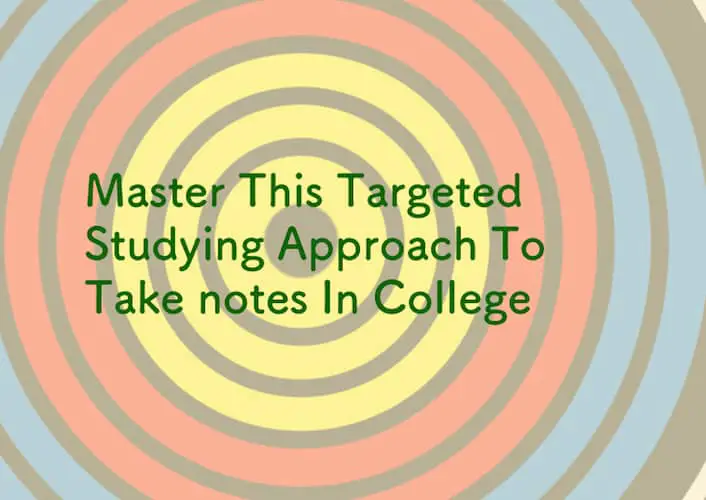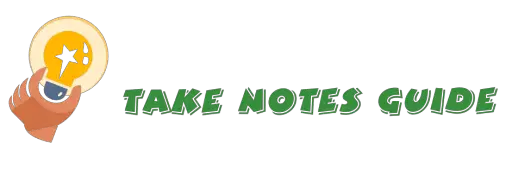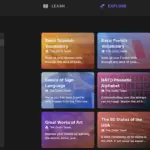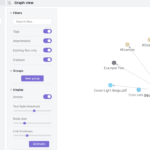Master this uncommon and powerful way (MR3) to take notes in college. These 3 steps should make sense to any learners. The first step is to recognize what you want to accomplish. The second is to put yourself in a better mental state to understand. The third is to take the notes in digestible bits, yet conquering and learning more with each session.
The Targeted Studying Approach
- Mirror your notes to look like answering exam or practice questions. Scan for keywords, bolded text, diagrams and examples.
- Relax before and after each session to focus on understanding.
- Note or summarise to about three Q&As down that matters the most you just learned. Review them and plan ahead.
Abbreviated:MR3- Mirror, Relax & 3 Q&A
These steps can also be used for similar situations that you are tested on or modified to suit your needs as long as the process involves 3 steps: before, during and after efforts.
Step 1: Expectation Mind Training with Mirror Notes
Essentially: Look at the format of previous exams and practice questions. Write your notes in the same format. Scan for keywords, examples, bolds and diagrams. Know and expect what concepts will be covered later.
What are they expecting? Multiple choice questions? A short question and long paragraphs answers? One question followed by a drawing of some chemical compound? Mixture depending on which chapter? You can figure that out easily by going through past exams questions. Reverse engineer. The point here is not to understand everything, but to set your expectation right. Do not feel overwhelmed while looking through past questions, you are just looking through to get a feel what the question and answer format may be like.
If you do not have past year questions, use the questions at the end of the chapters or any other similar resources. It will be doubtful a person can complete all the questions independently and correctly at the end of study sessions and fail the exam unless the exam is not testing at the right level or not based on the textbook you studied from or graded unfairly. Find out which textbooks are most relevant or just focus on what resources you have. You may even go to local textbooks store a month before semester starts, browse through one book at a time to see the questions. Write down the keywords for each chapter or jot down a few random questions per chapter. Do not feel nervous at this point because you do not understand yet.
Scan for keywords while you are browsing through the questions or main text for bolded text, diagrams, and examples. Just a simple acknowledgment that these are what will be covered will suffice for now. Unless you are a genius, the goal is not to understand everything in one single glance through the book. You may repeat one to two more times to remember better and jot down more keywords. The goal is to set your expectations what will be covered and know when to focus more when these concepts are taught and mentioned. Alternatively, ask yourself why is this covered and how does it fit in the whole picture.
Why keywords, bolds, diagrams or examples?
This is to target quickly what you need to pass or score. One may grasp a concept faster when they look for these first to understand, and then branch out to master and build on more concepts. But you must pay attention to the flow of the teaching to understand the basics first and then intermediate to advanced later. So pay more attention to the beginning of the chapter if you can. Put yourself in the position of an examiner who has to mark hundreds or thousands of papers within a limited time frame, you probably only have seconds to a couple of minutes for each paper, then you have to scan for papers and look quickly for some keywords and diagrams or certain elements that indicate understanding. Outstanding students should have better answers that look different from average ones.
Moreover, the more you look at these questions, the more you remember them and know the importance increase as the number of times they are asked in similar fashion. The more you read about the answers, the more probable you understand more of it. Frequent reflection may help more in difficult topics.
Multiple choice questions
Make your note into ordered bullet points with the different close answers and tick the one correct answer beside but know why this and not the other. Students these days are tested in different subjects and format, so find out which subject or even which chapters is this format.
Essays
If you are expected to write a lot expressing your views, then get used to it starting with your notes asking some previous years questions and write away in your notes. After a while, this becomes a second nature habit and you just become a writer whether you saw the same question style in your room or exam hall.
Drawings and others
Those questions which demand some form of mathematical equations or diagrams or drawings are kind of self-explanatory, but there is no substitute for practice. Still, it does not hurt to find out what you may be required to draw, how long and what are they are looking for.
Please read about micro drawing under Supercharge With More Than 20 Ways To Take Better Notes.
Oral
Evidently you have to speak well in that context. This is not just a matter of taking notes. Practise and practise pronunciations and speaking.
Contextual experience
MR3 is a practical and innovative approach for college and university students. I like this one because it lets me know beforehand what and set our expectation right. Say my exams are all MCQs testing my understanding in points form, then my notes are written in the same or very similar format like bullets points with a tick at the correct answer if applicable. With practice, we are not offset with nervousness at an unfamiliar or unnatural asking style like multiple choice questions that we do not use in everyday conversational life. Also, your keywords scanning and diagrams and examples experience should quickly identify which questions are probable for which.
Why mirrored notes?
If your notes are written in the same style then it helps to calm you down and know that this is how you are studying for. Not convinced? Just look back at how your old notes were written and compare with the exams or practice format to see how different they look. You are tested in a particular format, it does not matter how customised or pretty your own notes are to score. If you are tested to write your own notes in your usual style, then you should get a near or perfect score, but you are not. Genius or experienced test takers can be more at ease at exams without much adjustment or practise, but any average student can start training to set their expectations right straight from their own notes. The more your notes look like an exam format the better. More importantly, if you have studied and know your stuffs, you should be more naturally at ease when you see the right questions you know you should be able to answer.
When you have different formats required for studying one subject, then play along and mirror the different types of questions & answers format. You do not want to be taken by surprise. Some people may like to use past questions and answers to study, this can be effective once you know the basics well. We still need to know our stuff well. Do not walk into an exam hall not knowing what to expect or expecting different.
Time allocation
You can start calculating how much time each question may take and how much time you may spend on each question. This is also setting up your expectation. When you study or review to answer a question, keep tabs on how much time you spend, just knowing whether you answer in time or not will let you know how prepared you are and if you are a scorer or not. You normally do not need to wait till the last exam to know if you can pass or not. This is mostly or all based on logic or skill, not just a stroke of luck though you may need some in uncertain cases.
First day of semester
I recommend colleges and teachers to show their students on the first day what and how they will be tested on to be fair. Schools expect students to perform well in exams from day one without telling and showing them what or how their exams are like. And students follow along and expect all to be well as long as they attend and sit through all the classes until tests and mock exams show them what they lack much too late into the semester. In the first 15 minutes or so of the first-semester class, show them example questions and how to answer them, at least it register in their minds what to target for. This may also act as a stimulant or accelerant or memory aid like deliberately flashing difficult topics cards and speaking in a professional manner in the presence of a baby. Show the students a short video recording of how a top student answer a few questions so they can model after him or her, this is akin to children looking up to their parents as role models.
Step 2: Relax before and after
Before you start each session: Close your eyes, relax for a few seconds. Tell yourself mentally you are going to start to focus on understanding. Listen or read attentively for that session. Take frequent breaks of relaxation for a few seconds when you can. Take notes only when you do not have to be distracted from understanding.
At the end of the session, close your eyes and relax again for a few seconds, before starting to think of what you just learned by moving to the next step.
Learn to relax and focus like an Olympic gold medal diver right before a high difficulty dive.
Step 3: Three Q&As. Review. Plan.
Now we have settled on the format we should immerse in and put ourselves in a relaxed mood, let’s focus on a powerful way to implement and take these types of notes for students to pass or nail your exams:
Example session
For each study session/chapter/lesson/class:
- Note or summarise to about 3 (more or less) most important summarised points you learned and why. It is better to focus on understanding first and take your notes later or even after the whole sitting session.
- Write down what are the possible questions to ask in the format tested
- Answer the question correctly and even add more to reward yourself bonus points
- Close your eyes and relax, remember the notes or points you just took clearly. Do this at least 2 times for better effect.
- Review at spaced repetitions for the materials if possible, especially for subjects that require memory muscle and drills.
- Optional: Branch out to 3 more points every time you review if there are simply too much material to cover in that chapter or session at first go. You have done well by the time you have reviewed enough times to cover understanding all points and remember them.
- Plan ahead how the exam should work out. Work out how much time each type of questions e.g. difficult, medium or easy level. Divide them up among the whole exam duration. Work on difficult ones first within the allocated timeframe so you can speed through medium and easier ones and still score points even when you are in a hurry. The opposite is unfavourable because you will be more stressed out and worried if you cannot complete in time having wasted probably too much time on easier ones first. Do not overspend on an allocated time for a difficult or easy question.
- Right before exam, close you eyes and relax as usual. Then quickly glance through all the questions to know what you can or cannot answer and allocate the time as you intended on those that you can. Work in a fast pace to give yourself a good start and finish it early so you can go through and check at least once including the difficult ones.
Do this like YOU are the person who came out with the exam questions and answers. Think as an examiner: Is this question testing candidate’s memory or logical understanding of the subject? Conversely, if there was nothing important written or drawn or asked or understood, then have you just wasted your time sitting there?
In case you wonder why three questions? Well, it is much easier to remember at one go, especially if you are the type of students who just sit through without learning much. 3 per sitting session that you can understand and remember beats nothing and adds up pretty quick after many sessions. If an exam will have 60 questions in total spread out equally across 20 chapters, then you should have 3 questions tested from every chapter. You may have to adjust from 3 accordingly to suit your needs. Some questions may score more marks or may require more elaborate answers because of its nature.
You may take pictures or audio recording of lectures with permission to enhance your learning experience. When you review your notes together with the original images and audio of teachings attached, you may remember better with the visual and audio aid and help to clarify any doubts or correct any mistakes you made. But I would discourage long video clips because to review a whole lengthy video may not be an effective use of your time. Very short video clips may work also only if you re-play it enough to understand and remember it. Do note that for some subjects, you still need to keep practicing and drill it to be effective e.g. Maths and speaking a foreign language.

Why is this a targeted studying approach?
Step 1,2 and 3 combined for a well-planned before (deliberate exam notes format), during and after (guessing what likely may be tested). Basically, this is planning for exam success in my humble opinion. If you can only do one, then pick Step 3 to go. I would say Step 3 could be what most geniuses would do intuitively without being taught. You do not want to walk into an exam clueless. Have a designed plan of note-taking method attack. Be independent and prepare yourself before starting to take notes.
What if I still do not understand after paying attention?
- Break down that point into the smallest possible units that you feasibly can.
- Research and clarify each units until you understand it.
- Then put together all the units and then reflect upon it again and again.
- Think of the possibilities this can make sense. Consider from another angle or perspective.
- Ask yourself different questions regarding that point and answer them.
- Google and ask the forum if you still do not understand the units or point. A difficult concept can be a popular question that is already answered on the web.
- Ask you instructor if all else fails.
Practice and give this method enough time to work. You can decide after about 10 sessions if this works for you. When you are doing this like second nature, you just have to focus on understanding and then take notes.
Another example:
2 weeks before term or semester starts, look at and be familiar with the past years’ questions format and types of questions that would be asked. For that chapter, you want to know what is important for you to listen up for when mentioned. If possible, remember which concepts were tested on and look forward to filling in the blanks on your doubts. If you already know the basics and could even figure out the rest of it simply by going through the questions, that is even better. Imagine the benefits of reinforcing and reviewing by attending class, this will also build the confidence of the student. In this case instead of being conceited and just sitting through, perhaps what the student can do is to attempt harder questions, or develop new ideas or go beyond the purpose of a class such as blogging to help others or even write a book. Opportunities for improvement are aplenty when you are open and prepared for it. Can you be knowledgable and creative enough to start a low capital entrepreneurial business?
Right before the start of class, session or lecture, close your eyes and relax to prepare for the coming long attentive duration.
Take minimal or only important notes when there is a pause or at the end to avoid distraction. You may also note down what you do not understand so you can address them later.
After class or session, close your eyes and relax again, start to remember your notes what you wrote or typed, and understand how all the points relate and link to each other. Review them in your mind and plan for future reviews at spaced repetitions. The more familiar you are, the faster should be the review.
You know you are likely to nail the test and exam when you can answer the important and main concepts and questions with ease without having to struggle to remember the points and facts. Say give yourself 3 seconds to remember the points for one example question, write down in one or few minutes depending on type or the level of details and difficulty. 60 questions x 2 minutes = 120 minutes or 2 hours on average. Plan well to succeed.
It will be good if you can schedule one mock exam for yourself for the experience. You may do it at home with last year’s exam questions. If you do not have access to it, use selected questions from textbooks or guides or come out with your own from your reviews. Ask your tutor or teacher if they have and learn from the answers as well. Do this only when you are through with understanding and revisions of your notes, because it will not matter much if you do not understand.
Sleep well before the day of the exam, relax for seconds right before the exam, quickly glance through the questions and get to work on the difficult ones in the time frame you set for yourself, then to the medium and easy ones.
Types Of Notes Takers for Students
Best Case Scenario:
Read or listened or whatever just once, understood inside-out, and then just wrote a note condensing its essence and even can predict what the questions that will be asked. {Think gifted}
Possible Second (Aim for this!!):
Go through the text or material one or two times before lecture or meeting with somewhat basic or even good understanding. And take notes after better understanding during the presentation or lecture. {Smart}
Possible Third:
Did not study or understand, walk into a class or start taking notes upon first reading or listening, and hopefully keep up with everything {Uphill}
Lazy students: This can still work for gifted some but this should be the least you MUST do if you want to have a chance at passing an exam: Attend every single lecture and focus to understand. Take notes if you do not have a photographic memory.
Based on the above 3 scenarios, one can better appreciate the benefits of taking notes for different individual experiences.
Best of luck to your academic endeavours and be kind to others!
Related Questions
Where can I get past exams and practice questions?
- Practice questions at the back of each chapter in textbooks
- Scout your local bookstores and libraries for practice test questions books
- StuDocu
- Koofers
- Amazon (affiliate link)
Where to get help to set review reminders?
- Memrise is a good and free web service that can help students review their notes with spaced repetitions based on science and research
- Harvest.li is also a good simple email service that can help to remind learners when to review the materials with automatic spaced repetitions
- Evernote can be used to set a simple reminder date for when you want to review a note but this has to be done manually for every following reviews.
How to take notes without getting bored?
- When appropriate, take notes while listening to music e.g baroque
- When video recording is available, take the notes in your favourite place or where you are relaxed and comfortable or while with your pet
- Take a shower or go for a short walk may improve your mood before preparing to study and take notes
- If possible, break up your study sessions into shorter sessions to keep your attention fresh and sharp.
- Study subjects that you have vigorous interest and your notes should reflect your fervour. This can explain why some people are so intensely invested in a subject without persuasion while others may not care much of it despite much training since young.
- Study with like-minded, smart and interesting people may help to motivate and relieve boredom but it also can be a distraction or even an obstacle with the wrong crowd.
Am I taking notes effectively?
A way that may help to know this is when you notice time has passed quickly or you look up and realise you have lost track of what is going on around you. That may mean you are so focused on the task at hand that you ignore everything else. Please also read One Sensible Way To Take Notes Effectively!
What are some note-taking apps for students?
- Evernote for general notes
- Gingkoapp for organised notes and writings
- Markdown in Typora, StackEdit or Visual studio code for notes, Maths and UML diagrams
- Zotero and Scrible for web research
Should college students take notes on a laptop?
A study (Mueller & Oppenheimer 2014) suggest note-taking by hand is more effective. I would suggest you test out both for yourself and see what works best for you. I do not think everyone is the same. Plus it is how you understand and approach the teaching also. If you do prefer and fare better by hand, you may consider attaching your hand notes into Evernote, and you can even search for text within images. You may read my other post: Is it better to write or type notes.
Are there any exceptions to the 3 steps?
It is possible. It depends. I would think a practical or coding Bootcamp can be much more focus hands-on for practical results. However, even a CCIE (Cisco Certified Internetwork Expert) certification requires a lot of theory as well. But it is possible a complete developer course Bootcamp is very much practical on delivering results and nothing else other than a job interview will test on algorithm challenges. Then again, your goal may not be for a job but being self-employed e.g. building sites for passive income that profits via advertising from the traffic.
Should college students plan their budget and future?
On a side note, generally speaking, education is good. However, whatever your endeavors, be sure to calculate your expenses, course fees and plan for contingencies. Regrettably, students debt can spiral out of control and land themselves in a situation where their options are limited, perhaps paying interest for many years, declare bankruptcy or selling assets if any to pay off. I believe education should be free and very affordable with large government subsidies or aids. But private education institutions and study loans can be very costly nowadays. Unfortunately, parents or students have to start calculating in their teenage years and analyze whether these huge costs are worth it and can be paid back after school. Consider what is the salary, what if no job offers, what if the private school is closed down, what if you cannot pass out? You only need to do a simple calculation to know if the cost is worth it. And look around for cheaper or free alternatives, for example, Germany offers free tuition for education. Consider public schools, a boot camp that guarantees job placement before repayment, very affordable online courses with consistently many good reviews (for example, The Complete Web Developer Course; affiliate link) and homeschooling. There are stories of huge study loan debts on the internet so plan your future well and do not let yourself become a victim of large financial debt even before your adult life begins! In my opinion, it is better for an average student to incur low to no debt while getting a well recognized or useful certification or training or apprenticeship. Prestigious degrees can be useful too but you should know your situation and contingencies just in case. Also, students now can consider International Baccalaureate diploma program (benefits here) that promotes beyond academia to having a more inquisitive and caring attitude with a will for success (The IB diploma program seemed to be well received in Singapore – news report here).
Moreover, we need to be prudent and careful where our hard-earned money are kept or goes. For example, a company may advertise a high interest bank account backed with FDIC through partnered banks secure funds. If it sounds too good to be true, it probably is. In this case, people who still cannot withdraw their funds probably learn this the hard way, and the unfortunate part is that some may have done more research before mistakenly convince themselves. Remember, there are only too many such scams and cheats ready to fleece you of your money, and it is indeed very sad that young people and future generations are left to learn and defend themselves from all sorts of scams. Perhaps we should have a short or even full course as part of the standard education that help students detect, report, fight and prevent scams and protect the general public.
Why college students may use Evernote?
- It is easy to use
- You can take photo image, attach in a note and search text in images
- You notes should be safe, especially when synced to the cloud. So far, I probably have not lost notes in Evernote compared to reports of some other unstable notes app.
Is there a resource to help with relaxation or fight insomnia?
One may listen to light music such as RadioTunes Sleep Relaxation curated channel. Please note this may not be suitable for students who tend to fall asleep in class.
Is there any program that may help students pass GCSE Maths?
How to pass your GCSE Maths in 4 weeks – I like the testimonials with photos of results proof but you have to decide for yourself if this is authentic or worth it. Kindle/Paperback. Please note these are affiliate links and I have not tried this program myself so research and read the amazon reviews if you wish to consider this.
Please also refer to Resources for more educational guides such as Mind Palace for memory aid.







